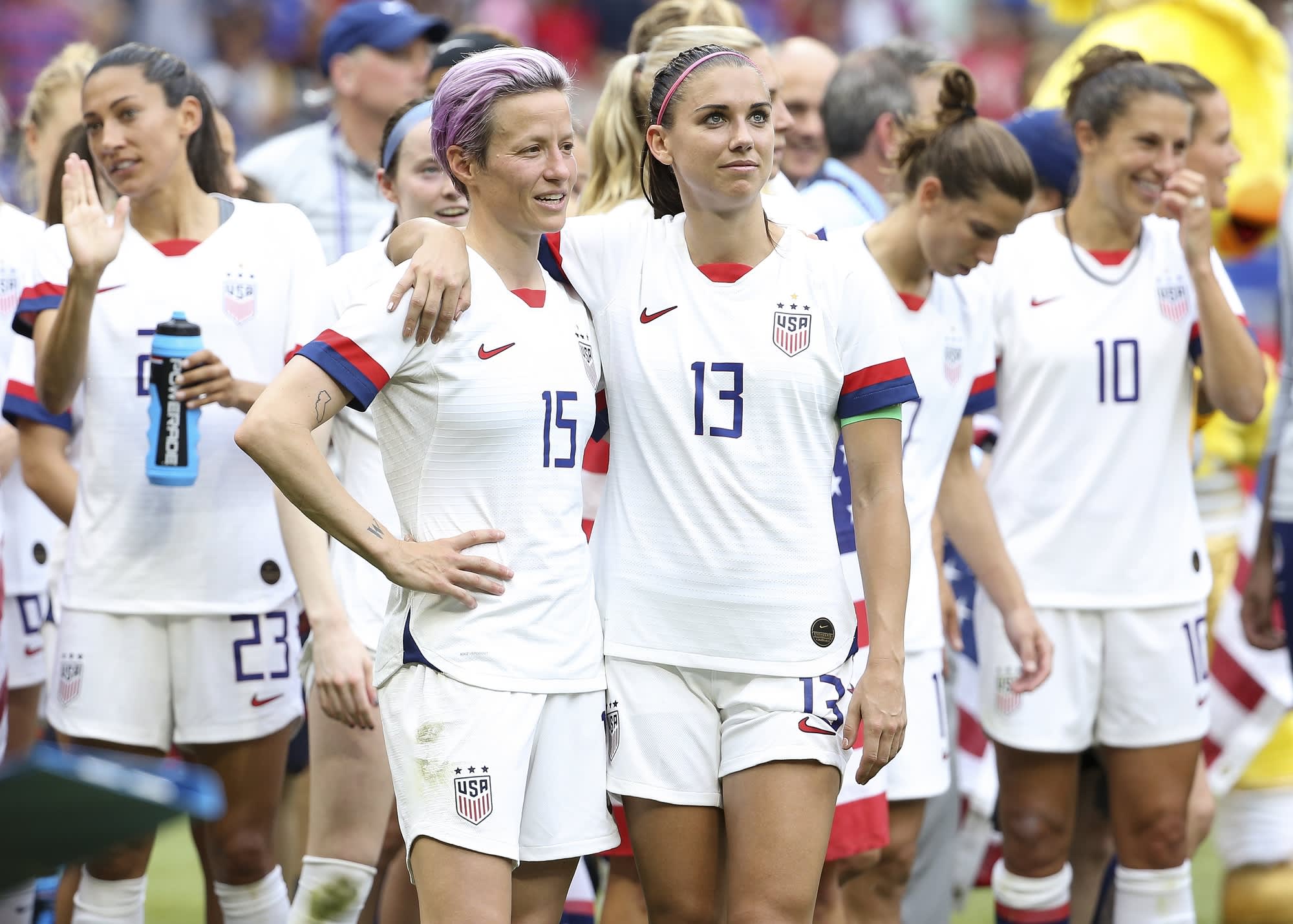
Megan Rapinoe and Alex Morgan during the trophy ceremony following the 2019 FIFA Women's World Cup France Final match between The United State of America (USA) and The Netherlands (Holland) at Groupama Stadium on July 7, 2019 in Decines near Lyon, France.
Jean Catuffe/Getty Images
Soccer's world governing body, FIFA, has unanimously agreed to a proposal to expand the number of teams taking part in the Women's World Cup from 24 to 32 for the next tournament in 2023.
Prospective host countries will now be revising their bids, with China, Brazil and even a joint bid expressed between North and South Korea all in the running.
"The astounding success of this year's FIFA Women's World Cup in France made it very clear that this is the time to keep the momentum going and take concrete steps to foster the growth of women's football," FIFA President Gianni Infantino said Wednesday.
The expansion will have implications beyond the addition of the eight teams. It means that dozens more member associations can organize their women's soccer programs and funding, knowing they have a realistic chance of qualifying.
Ahead of the Women's World Cup final in July, Infantino proposed doubling the total prize money to $60 million in 2023. The figure would still fall way short of the men's edition in Russia last year, featuring 32 teams and a total prize pot of $400 million.
However, it also confirmed that amount will rise to $440 million for the next men's World Cup, in Qatar in 2022.
Pay dispute heats up
An expanded World Cup on the back of another triumph for the U.S. women's team earlier this summer could well strengthen its case in the ongoing pay dispute with the United States Soccer Federation.
Earlier this week, a spokesperson for the United States women's national soccer team accused its governing body of a "ruse," as it continues to fight for equal pay in line with what the men's side receives.
Molly Levinson is representing the players in their gender discrimination litigation case against the USSF and disputed claims made by USSF President Carlos Cordeiro on Monday, who claimed that the women's team had actually been paid more than the men's team over the last decade.
"U.S. Soccer has, over the past decade, paid our Women's National Team more than our Men's National Team in salaries and game bonuses, and we continue to make unprecedented investments in our women's program," Cordeiro said in a letter.
He pointed to figures that stated there had been a total of $34.1 million in salary and game bonuses paid to the women between 2010 and 2018, compared with $26.4 million distributed to the men during the same time. He added that was not counting the significant additional value of various benefits that women players receive but men do not.
In a response, the USWNT said the numbers were "utterly false," which was backed up by the U.S. men's team on Tuesday, which also accused the U.S. Soccer Federation of refusing to pay national team players a fair share of generated revenue.
The United States National Soccer Team Players Association, the labor organization for members of the men's national team, showed its dissatisfaction with the details of Cordeiro's letter.
"This is more of the same from a Federation that is constantly in disputes and litigation and focuses on increasing revenue and profits without any idea how to use that money to grow the sport," the union said Tuesday.
Cordeiro said each team chose to negotiate a different compensation package with U.S Soccer and there was not favoritism.
The federation said female players chose to have a guaranteed salary; U.S Soccer therefore pays each contracted player a base salary of $100,000 per year, whereas in contrast, the men's national team has no guaranteed salary and players are paid only for the training camps they attend and the games they play, plus game bonuses.
U.S. Soccer says it also pays its national team contracted players a $67,500 to $72,500 salary for playing in the National Women's Soccer League, something it says it does not do for men who play in Major League Soccer or any other men's professional league.
The pay dispute erupted in March, four months before the team went on to retain the FIFA Women's World Cup in France.
Each member of the women's team that won a record-extending fourth World Cup were named as plaintiffs in federal court when their lawsuit was filed, including top scorer and player of the tournament Megan Rapinoe.
Reaed More
Post a Comment